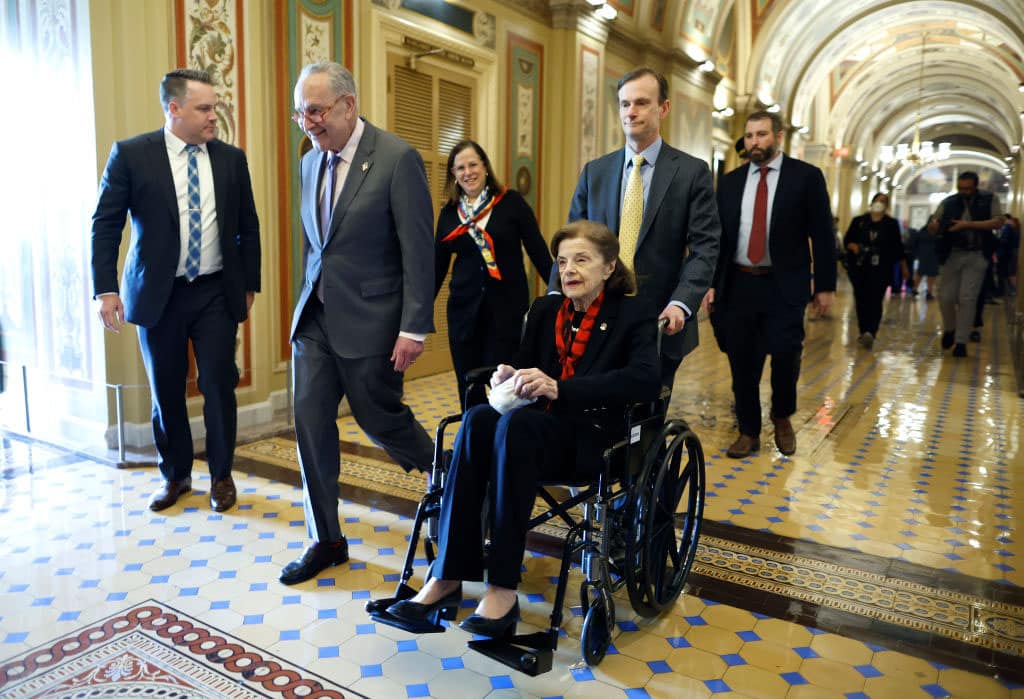 U.S. Senate Majority Leader Charles Schumer (D-NY) escorts Sen. Dianne Feinstein (D-CA) as she arrives at the U.S. Capitol following a long absence due to health issues on May 10, 2023 in Washington, DC. (Photo by Kevin Dietsch/Getty Images)
U.S. Senate Majority Leader Charles Schumer (D-NY) escorts Sen. Dianne Feinstein (D-CA) as she arrives at the U.S. Capitol following a long absence due to health issues on May 10, 2023 in Washington, DC. (Photo by Kevin Dietsch/Getty Images) From this distance, it doesn’t appear that Dianne Feinstein has had many good weeks this year, either in terms of her health or her political standing. But her return to Washington last week, which could have been a triumphant moment under better circumstances, had just the opposite effect for both Feinstein and her supporters, who continue to stand behind her in her efforts to remain in office.
Feinstein’s extended absence from Washington this year, as she recovered from a series of health problems that the New York Times detailed in previously undisclosed specificity last week, has been the focus of intense debate and speculation in Washington and California political circles. But for most state residents, who don’t monitor U.S. Senate proceedings on a daily basis, Feinstein’s situation has been a fairly abstract matter. The practical consequences of her inability to vote has caused all sorts of problems for the Biden Administration, as several of the president’s nominees have languished without her support, and the need for her presence in a closely divided Senate has damaged the prospects of other Democratic legislative priorities. But most Californians barely noticed.
The practical consequences of Feinstein’s inability to vote has caused all sorts of problems for the Biden Administration, as several of the president’s nominees have languished without her support.
That lack of awareness from Feinstein’s constituents may have changed dramatically last week, when photos and video of an 89-year-old woman struggling to navigate the halls of Congress made it clear how diminished California’s senior Senator had become. The visuals were stunning – and depressing. This once powerful icon read simple statements from notes given to her by aides, she seemed confused when answering questions from reporters, but most alarming was the dramatic diminishment of her physical condition and appearance. Half of her face was frozen and one eye was nearly shut, providing an uncomfortable visual message about the extent of her health challenges. Feinstein’s condition was now much more tangible – and visceral – and the pressure on her to step down will now grow even greater.
With a few exceptions, most of those Democrats urging her to resign represent the party’s progressive wing and have long been unhappy by her centrist voting record. The question is now whether those public statements will start coming from more moderate and establishment voices, which will indicate that the concerns within her party are spreading beyond her ideological opponents to a broader swath of party leadership. It was notable that Representative Dean Phillips (D-Minn.), who refers to himself on his website as a “radical pragmatist and problem solver”, this week renewed and escalated his calls for his fellow Democrat to step down with an op-ed piece in the online publication The Daily Beast in which he said “it was never a question of her qualifications or character, rather of her competency to serve.”
But Phillips then added a much harsher assessment, suggesting that Feinstein’s decision to retain her seat despite her infirmities contributed to voters’ lack of confidence in the political process. “If elected leaders continue doing what’s politically expedient over what is right, this crisis of confidence and trust will only get worse.”
In an age of COVID and Iraq and Afghanistan in which politics seems hopelessly gridlocked and corrupt, it’s debatable how much Feinstein’s intransigence has impacted overall levels of voter cynicism. But this criticism is not coming from the far left but from another Democratic centrist. So it will be instructive as to whether other nervous members of the party establishment begin to go public with their concerns.
Even Feinstein’s strongest defenders must admit that she is no longer fulfilling most of the functions of her office. While all of us hope that she recovers to a point where she can author and negotiate legislation, meet with constituents and once again become a forceful voice on the issues that are most important for her, the likelihood of that restoration seems to be diminishing with great speed. It’s entirely possible that her determination to remain in office will no longer be sufficient.
I’ve written previously about how California Governor Gavin Newsom would very much want to avoid selecting Feinstein’s successor. The events of last week suggested that he might not have a choice.
Dan Schnur is a Professor at the University of California – Berkeley, USC and Pepperdine. Join Dan for his weekly webinar “Politics in the Time of Coronavirus” (www.lawac.org) on Tuesdays at 5 PM.























 More news and opinions than at a Shabbat dinner, right in your inbox.
More news and opinions than at a Shabbat dinner, right in your inbox.